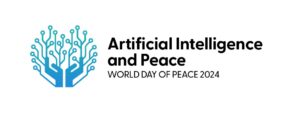
19.01.2024
World Peace Day 2024-Pope Francis invites us to delve into the possibilities and risks of AI
In his message for the 57th World Day of Peace 2024, Pope Francis considers the impact of artificial intelligence on global peace and calls on the international community to “…work united toward adopting a binding international treaty regulating the development and use of artificial intelligence in its many forms. The goal of regulation, of course, should not only be the prevention of bad practices, but also the encouragement of good practices, stimulating new and creative approaches and facilitating personal and collective initiatives.”
New technologies must always be used for “the pursuit of peace and the common good, in the service of the integral development of individuals and communities.” Pope Francis urged world leaders to ensure that advances in artificial intelligence “ultimately serve the cause of human fraternity and peace.”
Many voices are joining and wishing to collaborate with this initiative. Professor Catherine Belzung, Co-coordinator of the Focolare Movement’s Center for Dialogue with Culture, said, “What strikes me about this message is first of all that it is addressed not only to Catholics, but to ‘all men and women of our time.’ He believes that we are all responsible for this challenge, and not just some decision makers. It is a balanced message in the sense that it highlights not only the risks but also the possible benefits of these technologies, because they can also promote fraternity and peace. And finally, it also shows that the Pontiff is very much in tune with our times, that he is attentive to contemporary challenges: it is an invitation for all of us to do the same.”
Isabel Gatti, NetOne International Coordinator, expresses joy: “It is with great joy that I received Pope Francis’ message on peace and its relationship with artificial intelligence. Globally, inequality is growing in all dimensions and technological developments are fuelling this process. As a society, we are neglecting our responsibility to ensure that humanity’s cultural goods – including digital ones – can reach everyone. We need shared ethical principles to overcome this crisis and change the prevailing development paradigm. This is the only possible basis for creating the conditions for our planet to become a Land of Peace.”
Paul O’Hara, professor at Sophia University Institute points out, “For the many people accustomed to the fact that World Peace Day might be an occasion for the Pontiff’s call for peace and a condemnation of the various ongoing wars, his Message this year, which focuses on artificial intelligence, might come as something surprising or, even, disappointing. On closer inspection, however, it is a prophetic announcement that anticipates a possible source of divisions among people and even among nations.”
The inherent ambivalence of technological developments
The message emphasizes the “ethical dimension” of these new technologies that are transforming humanity in all aspects of life. Professor Belzung points out that “the Pope emphasizes that scientific research and technological innovations such as those brought by Artificial Intelligence are not neutral, but can bring with them dangers to social cohesion and peace related to their indiscriminate use. This is true in a number of areas, and the Pope explicitly points to some of them, such as the widespread use of population surveillance, the risk of sophisticated weapons falling into the hands of non-state groups, or the targeting of people without artificial systems being slowed by the perceived devastation caused.”
Although Pope Francis did not directly address the potential use of artificial intelligence in nuclear weapons, he asked a question, “What impact will the new digital technologies have on individual lives and societies, on international stability and peace?” According to the pontiff, “the world does not need new technologies that contribute to the unjust development of arms trade and trafficking and consequently end up promoting the madness of war.”
The Pope urges interdisciplinary dialogue, ethical development of algorithms (algo-ethics) and inclusion of diverse voices in decision-making processes. He concludes with the hope that the development of AI can contribute to human fraternity and peace in the world: “because peace is the fruit of relationships that recognize and welcome others in their inalienable dignity, and of sincere cooperation and commitment in the search for the integral development of all individuals and peoples. As NetOne, together with everyone, we want to join our efforts with so many to promote and encourage a culture of peace.








